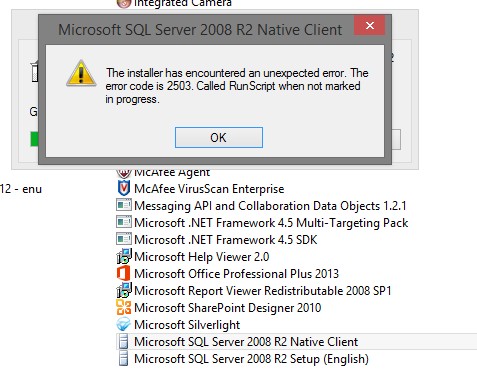Cannot Uninstall Microsoft Sql Server Native Client 2008
Should I remove Microsoft SQL Server Native Client by Microsoft? The SQL Server Native Client contains the SQL Server ODBC driver and the SQL Server OLE DB provider in one native dynamic link library (DLL) supporting applications using native-code APIs (ODBC, OLE. When is it safe to uninstall SQL Server Native Client programmatically? How do you determine when it is safe to uninstall the 'SQL Server Native Client'? I believe that simply checking whether there is an SQL Server instance installed is naive. HKEY_LOCAL_MACHINE SOFTWARE Microsoft Microsoft SQL Native Client MSIRefCount HKEY_LOCAL.
- Download Sql Server 2008 R2 Native Client
- 2008 Sql Native Client Download
- Cannot Uninstall Microsoft Sql Server Native Client 2008 R2
- Cannot Uninstall Microsoft Sql Server Native Client 2008 Pdf
A very mysterious problem coming up :P
I have a server configured with a static IP. I have installed SQL Server 2008 R2 with additional instance (ITAPP). Now When I use the IP to access the SQL Server following things happens:
Client Machine:
Connected Successfully..
But when I use:
HResult 0xFFFFFFFF, Level 16, State 1 SQL Network Interfaces: Error Locating Server/Instance Specified [xFFFFFFFF].
Sqlcmd: Error: Microsoft SQL Native Client : An error has occurred while establishing a connection to the server.
When connecting to SQL Server 2005, this failure may be caused by the fact that under the default settings SQL Server does not allow remote connections.

Sqlcmd: Error: Microsoft SQL Native Client : Login timeout expired.
Even on the same machine (where the SQL Server is installed) using SQL Server Management Studio. I have put off my firewall on both machines, even allow all the protocols for ITAPP (Shared Memory, Named Pipes, TCP/IP), also set Allow Remote connection to true.
One thing more when I use 127.0.0.1SQLITRAX to connect on server machine it connects Immediately.
Please help me out from this mess :)
Brian Webster2 Answers
maybe it's because it's a named instance on a remote server.
Named instance don't use the SQL Server standard Tcp-port 1433, only the default (unnamed) instance use the 1433 port.
Any other 'named' instance simply listen on another port.
So you should check in the SQL-Server configurator, on which TCP port is listening, and then tell the client to connect to this port.
Say that your named instance is listening to 12345 port, then the client should connect using the following command
when you specify the TCP port, then you don't need the name of the instance.
In my understanding the name of the instance is a way for SQL Server services to find the TCP port that this named instance is listening on.
But for this to work your client need to be able to access those other services that resolve the instance name of SQL Server (maybe it's the Sql server Agent / SQL Server browser, but I'm not sure)

Update
Here is a screenshot that show where to set the TPC port for a SQL Server named instance.
so, on which TCP port is your named instance of SQL Server listening?
Download Sql Server 2008 R2 Native Client
MaxMaxThe SQL Server Browser service needs to be accessible to be able to connect to named instances.
See this article for more info on what it does and which ports to open on your firewall
2008 Sql Native Client Download
Cassandra corrosion software download. This technet article provides a handy script to open up all required ports
Filip De Vos